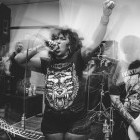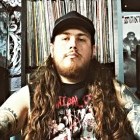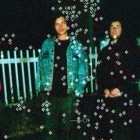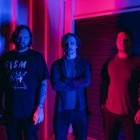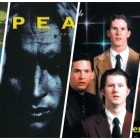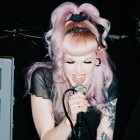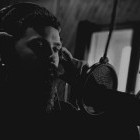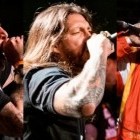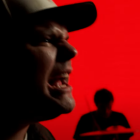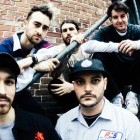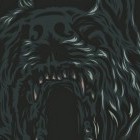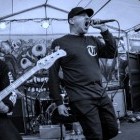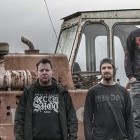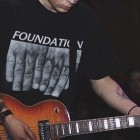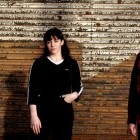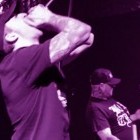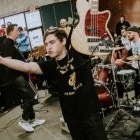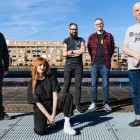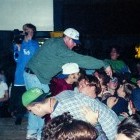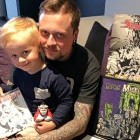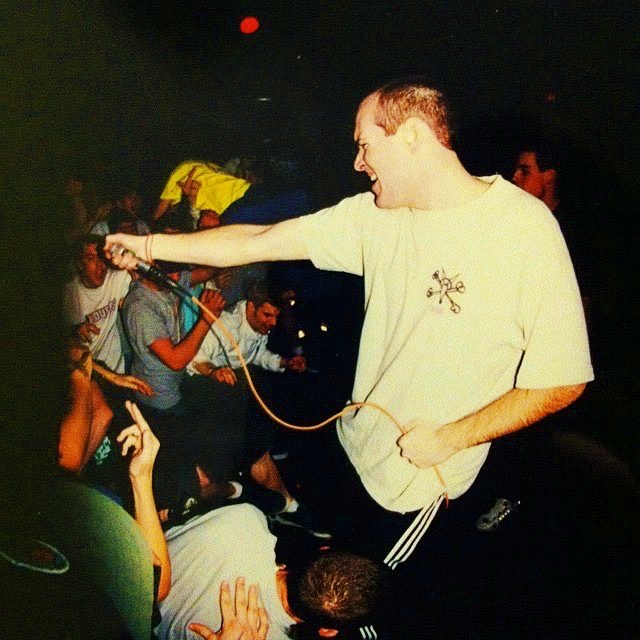
Rain on the Parade was a hardcore band from Philadelphia, Pennsylvania founded in 1994. Often compared to the classic Youth Crew bands and sound that emerged in the late '80s, the group dropped a handful of releases during their few years together, including a pair of EPs and an LP.
Members of Rain on the Parade played in, or went onto play in after their breakup, in such bands as Ink & Dagger, Shark Attack, and Terror.
I recently spoke with Rain on the Parade vocalist Ronny "Sarge" Little and guitarist Justin Phillips about the band's history, the hardcore scene of their era, and thoughts on their discography.
Tell me a bit about your childhoods in the Philadelphia area and how you came to discover hardcore music. Did you come through the metal-to-hardcore route like so many other people in our age group?
(Ronny Little, vocals): There is no word in the English language to describe just how much I hated school when I was in 9th grade. I was a poor student and had very few friends. I would skip classes to cope. Often, I’d pretend to miss the bus in the morning and my Mom, thinking it was some kind of punishment, would make me walk to school (4 miles away) to teach me a lesson.
Meanwhile, I’d walk to a diner on the way to school, have a leisurely breakfast where I read the newspaper from front to back, then swagger into school like a boss an hour before lunch. I really enjoyed those mornings, but they often landed me in detention for tardiness.
It was in detention that I met Mark Cozgrove and Rich Smith, who turned me onto Suicidal Tendencies and DRI, which was usually blasting through Mark’s boombox on our walks home after detention. This was in 1985-86. At the time, I kind of liked the music they were exposing me to, but more-so because I thought the lyrics were clever and funny, rather than the power of the music.
Like beer and black coffee, the music part of it was an acquired taste for me. The first time hardcore music struck me like lightning was when I heard the two Minor Threat songs from the 'Flex Your Head' comp played on WPRB (Princeton University’s radio station, which played a lot of punk at the time). I remember quite clearly standing in my kitchen listening to those songs, and then going to Mark’s house with a blank cassette because I knew he had Minor Threat records. From there, I was dialed in and wanted to buy records, wear shirts, go to shows, and be a part of it all.
(Justin Phillips, guitar): Around the age of 13 in 1989, I was introduced to the world of hardcore and punk music. My older brother Mike, known as "Porkchop," was a regular at local shows in the Tri-state area, with City Gardens standing out as a notable venue. He also played guitar, which was a good match for my drum skills at the time. It is much easier to get good at an instrument when you have someone “at home” to jam with.
Before this exposure, I had already been exploring punk music through bands like Misfits and Dead Kennedys. Over time, I became particularly captivated by the do-it-yourself ethos of the hardcore and punk scenes. Porkchop and I had a very short lived “hardcorish” band in high school called Breaking Point which played, maybe, two gigs. But at one of those gigs is where I met all the guys that would become Disregard.
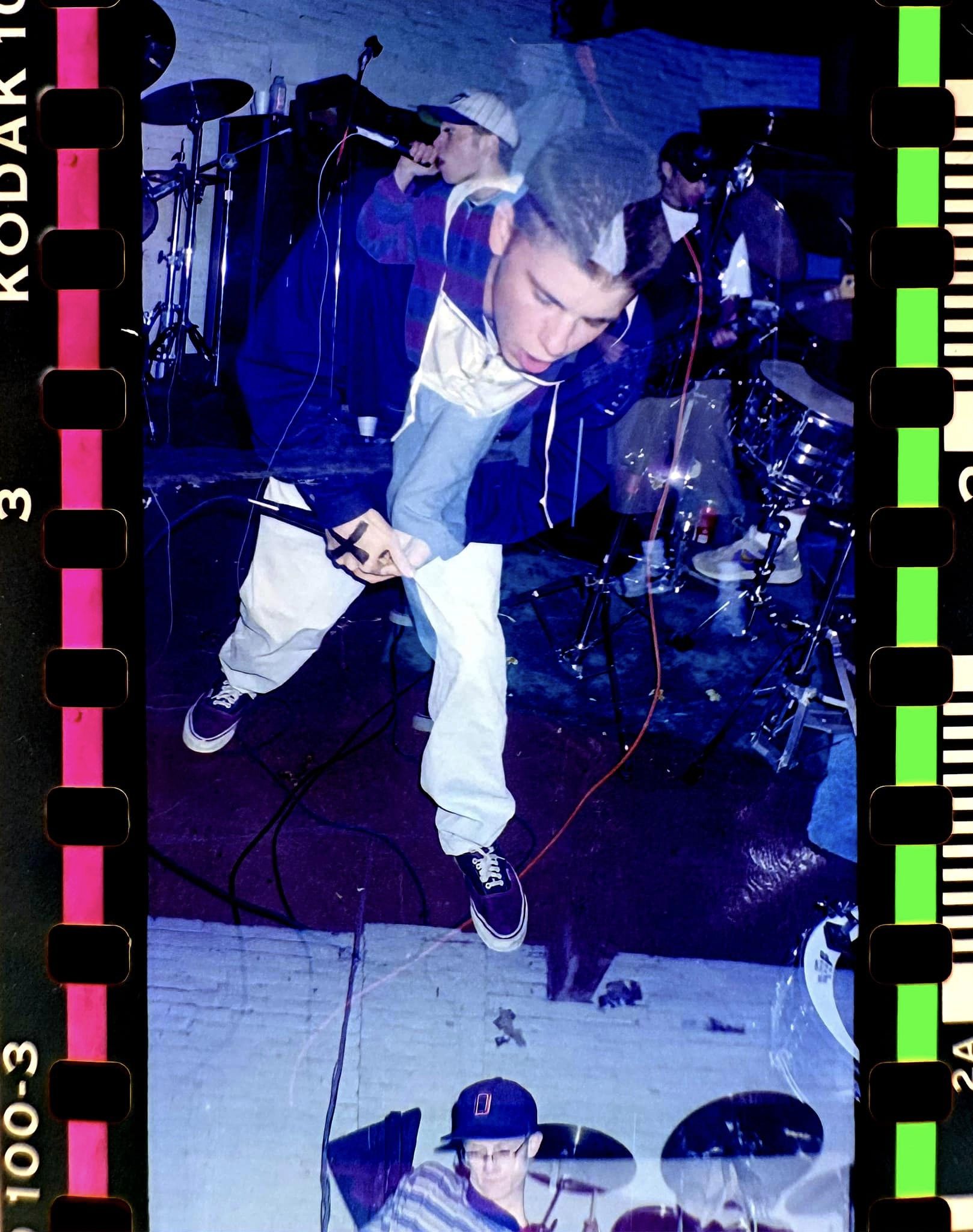
I think a lot of people think of Youth Crew-type bands when they think of Rain on the Parade, but what were some of the early bands and records that had a big impact on you both?
Ronny: Youth of Today was my biggest early influence when I was really ramping up into hardcore music. I knew every word to every song. Loved the energy and wanted to do something similar, even if that wasn’t the final result when it was my turn to make music.
When I got to see Youth of Today at Oliver J’s in Allentown, it was like a religious experience. The 'Break Down the Walls' LP meant more to me as a kid than any other record I can think of, ever, and Youth of Today turned me onto vegetarianism. I’m still a vegetarian all these years later.
Besides YOT, I loved Underdog and saw them every chance I got. Uniform Choice, Minor Threat, 7 Seconds, Verbal Assault, and Token Entry were other bands where I wore out their records on my turntable. I don’t know that any of them actually influenced the music that I’d eventually write, other than me trying (and failing) to channel [Uniform Choice vocalist] Pat Dubar on the song “Full Speed Ahead.” But they certainly put me on the path of wanting to write songs and get up there on stage.
Justin: During my formative years, my musical tastes were diverse, ranging from 80s Metallica to the Misfits, CCR and Beastie Boys. Thanks to Porkchop's consistent supply of hardcore music on a weekly basis, I was exposed to a variety of sounds.
Fortunately, our town boasted a local record store, Siren Records, which emerged in the late '80s. Interestingly, the store originated within a family-owned video rental shop that I frequented in my earlier years. It was a unique experience to be able to rent a classic like Blazing Saddles and explore the latest Misfits bootlegs in a single visit.
Siren Records had its share of typical counter workers who often attempted to guide impressionable youths like myself toward music they believed we should appreciate. This guidance succeeded about 50% of the time. During my high school years, I developed a strong affinity for Lifetime, and this influence manifested in the music we created with Disregard. [Dan] Yemins' guitar skills played a significant role in shaping my aspirations for my guitar sound on Full Speed Ahead.
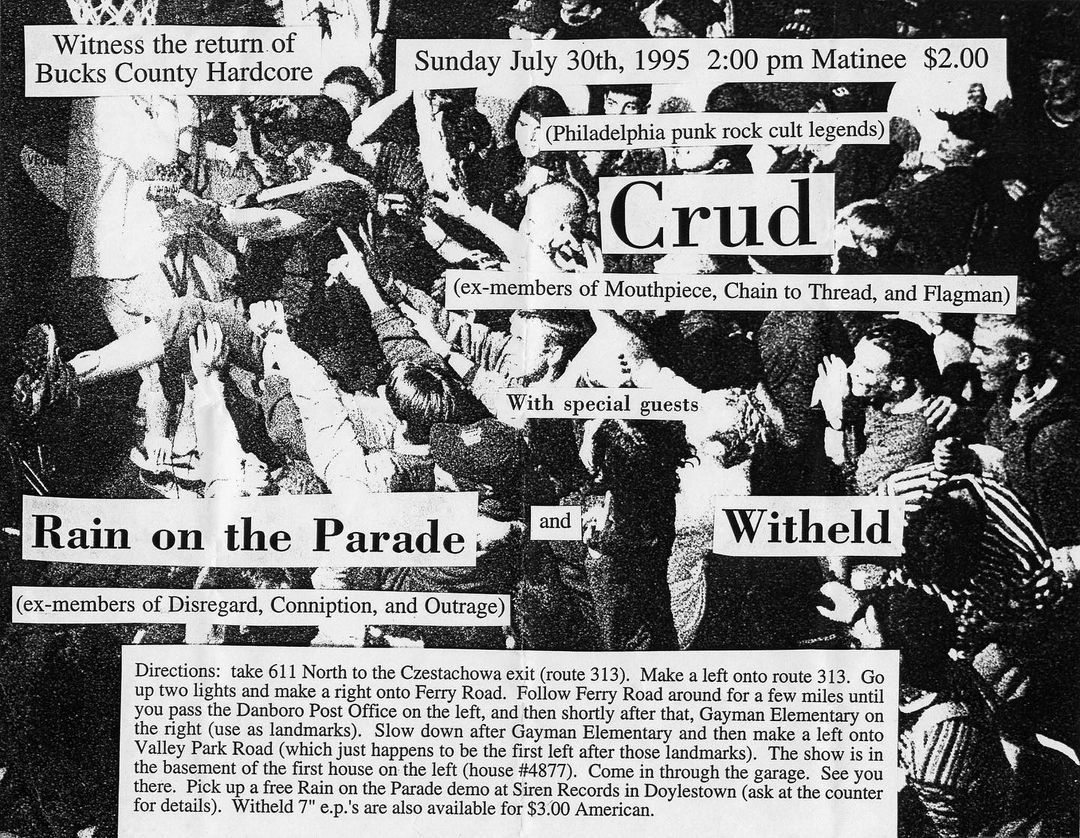
What is the genesis story behind Rain on the Parade?
Ronny: I was at City Gardens with my friends Alan and Brendan, watching Endpoint. All of us were thinking we could do better. The next week, we all got together in Brendan’s basement with DII, who was a friend of Brendan’s, practiced a few times, then recorded the first demo in 1994 before I went to college. The songs were "Said & Done," "Eating Crow," "Countdown," and "Bitter." At the time, the name of the band was actually Glue.
Brendan and Alan fell off quickly after. So, I had a demo, a DII, and nothing else to move forward with. It was hard finding people who wanted to play the music I wanted to play. We were in a holding pattern for about a year.
Fast forward to the summer of 1995 when I ran into Mike Phillips, Justin’s older brother, who I went to school with and shared a punk rock lunch table with. “Porkchop” was his name at the lunch table, and I’m pretty sure some folks still call him that to this day.
I remained friendly with Porkchop over the years after high school, and he kept telling me if I needed a drummer, I should call his little brother Justin, who was in Disregard as a singer. But since Disregard didn’t play a style of music I liked, I didn’t approach him. The months went by, I changed my mind, and everything fell into place.
Justin brought Don Devore (Frail, Ink & Dagger) into the band, who brought Dan O’Neill and Bill Perry with him. O’Neill was in the band for a minute before leaving to concentrate on Jazz June and Mandela Strikeforce, which opened up the spot at bass for Matt Smith. Don was over-committed, but was in the band long enough to record the Body Bag EP. His creative contribution to that record was the music to the song "Resolution." Justin and I wrote everything else, then just kept going and going. It was a great partnership.
Justin: In fifth grade, my journey into the world of music began when I had to choose an instrument for the school band. Inspired by my grandfather, a WWII veteran and former trumpet player in the marine band, I decided to try my hand at trumpet. However, it became evident quite quickly that I couldn't quite master it. Frustrated with the sheet music, I voiced my concerns to my teacher.
She suggested I switch to drums, citing their more straightforward sheet music. She arranged for a demonstration by her husband… Tony Vigilante, a professional jazz drummer. During the demo, everyone got a chance at Tony’s kit and when I got my turn I guess I dropped some pretty heavy beats. Impressed, Tony offered me private lessons, which my parents accepted, leading to two years of essential skills development.
Around the same time, my older brother, nicknamed "Porkchop," was well into his guitar playing. Together, we formed a high school band called "Breaking Point," which had a brief stint with only a few performances and included Alan on vocals who also appeared on the '94 ROTP demo. Later after ROTP, Porkchop and I would again play together in Atomic Age with me returning to drums. However, fate took an interesting turn during one of our shows at the Fiesta Motor Lodge in Willow Grove, PA.
There, I was approached by Don Devore, Bill Perri, Dan O'neill, and a group of guys from the Philly Burbs who were in search of a singer. They noticed me for my t-shirt choices, age, and possession of a driver's license. With my brother heading off to college, leaving me without a band, I accepted their offer. Unaware of their Philly connections, I joined Disregard, which played for three years, sharing stages with notable bands like Lifetime, Ashes, Flagman, Mouthpiece, Turning Point, Clutch, and others from the mid-early '90s hardcore scene.
As Disregard disbanded due to members pursuing college or other projects, I found myself at Bucks County Community College, working overnight shifts at a local gas station. One evening, Ronny, five years my senior, introduced himself. Though we had never met, he presented the '94 Demo and outlined his plans to revive hardcore. Despite some style differences in our musical preferences, he offered me the drumming position, overlooking these discrepancies due to his focused vision for the band.
I recall only two shows with me as the drummer in this lineup. Soon after, most of Disregard's members filtered through ROTP. When Don pursued other projects, Matt Smith stepped in as his replacement. It was then that I decided to shift my focus to playing the guitar. Bill Perri assumed the role of drummer and contributed to the Body Bag EP. My guitar skills were limited at the time, primarily derived from what I had learned from Porkchop over the years.
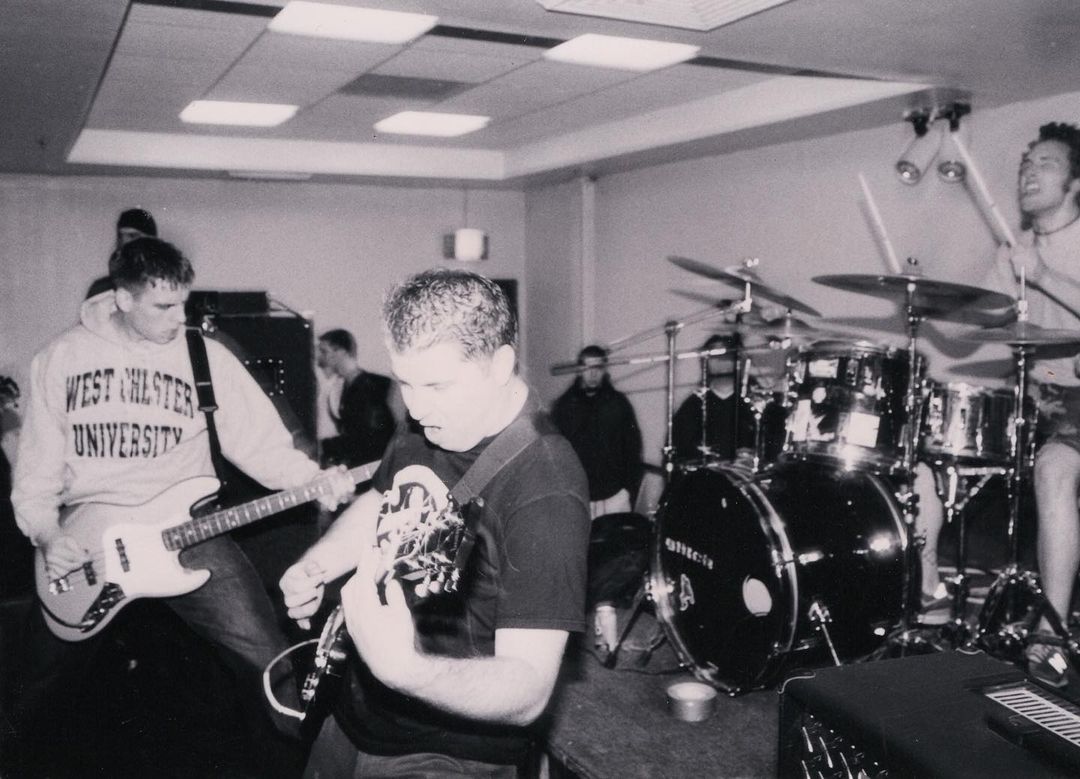
Were you clear on what direction you all wanted Rain on the Parade to head in musically from the start, or did that happen more organically?
Justin: Ronny “The Sarge," held a firm perspective on our sound. He advocated for a fast, furious, and loud approach. He frequently encouraged me to craft songs following the "less is more" concept. This concept was fitting as at the time my guitar skills were still building so “no leads” and “3 or 4 or 5 chords” is all you need.
Ronny: I just wanted to play the music I wanted to hear, which was loud, fast, and to the point. It had to be three chords because that was all I could play. Justin can tell you, I’m not a musician by any stretch of the imagination. But I can play just enough to show a musician what I want, and then have them polish it up into something worth playing.
There were a lot of huddles between Justin and I where, musically, I was just an ape going “ooo-ooo-AHH-AHH!” and Justin would somehow translate what I wanted perfectly. That’s basically how 33% of ROTP’s songs were written. It’s kind of nuts when I think about it.
But yeah, I was a bit of a tyrant about keeping things up tempo. I definitely clashed with drummers when they wanted to slow things down or throw in solos. When we recorded Body Bag, our drummer wanted to slow down a few of the songs and put a solo in another. We had been practicing these songs with a giddy-up pace for MONTHS, and then all of the sudden, our drummer was obstinate. Like, “nope, I’m the drummer. Can’t do this without me. We're playing it my way.” All of this while the meter is running and we’re lighting money on fire in a studio, arguing rather than recording.
Thankfully, Justin had enough and was just like, “Move over, Bill. I’ll play drums.” Justin is a good drummer, and that’s what it took for Bill to come around during that argument. The way Body Bag sounds literally came down to that moment. I’ll never forget it.
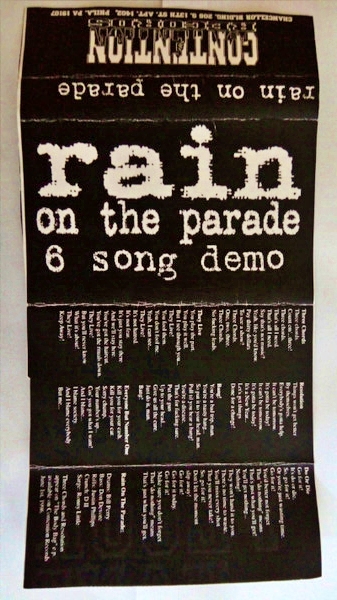
What do you remember about the response to the ROTP demo that came out in 1995? For me, I loved the straight-forward approach to what you were doing since by then a lot of bands from the scene were going in a more angular, post-hardcore direction. Either that or a metal-driven style.
Ronny: I don’t recall much about the reaction to it, other than it being largely positive. What I do remember is listening to the Ten Yard Fight and Floorpunch demos and thinking both were better than our demo. But then again, everything on that demo was written by a non-musician (me). The band didn’t really find its sound until I met Justin.
Justin: My initial reaction to the demo when Ronny presented it to me was that there were some good riffs, but there was definitely some work to be done. Both in song organization and recording production.
The Body Bag EP is where a lot more people took notice of the band. Tell me a bit about the shows you were playing around that time and if you noticed a certain energy beginning to bubble up around bands like ROTP, Atari, and Ten Yard Fight.
Ronny: When Body Bag came out in 1996, we played a lot of shows with a similar lineup. It would often be some combo of ROTP, Floorpunch, Ten Yard Fight, 97a, and Hands Tied opening up for more established bands like Ignite, H20, and Vision. As a result, we got to know the guys in all of the bands we’d open these shows with.
And then bands like Atari and Rancor started filtering onto these shows as well. I went to college with the Atari guys, and by extension, got to know all of the Rancor guys who were their friends from back home. Those two bands were always a lot of fun, and all of them were just the coolest guys.
The energy around these shows, I’d say, was just kind of like “YEAH. They don’t make em’ like this anymore!” Floorpunch had a total Raw Deal kind of thing going. TYF looked like the next version of Boston straight-edge. 97a was full-on skate thrash. And we were like…the Fuck You Fanzine audiobook? I guess for ROTP, it was stripped down hardcore with a bit of snark in the lyrics that wasn’t as prevalent in the 90’s as it was in the 80’s, which I think helped set us apart.
READ MORE: Atari: Pennsylvania Band Looks Back on Their Time in the ‘90s Hardcore Scene
The Full Speed Ahead EP is my favorite ROTP release. What memories stand out to you about writing/recording those songs?
Justin: The creative journey behind Full Speed Ahead took a unique turn with the addition of Chris Ross on drums. I distinctly recall him sharing his intention to infuse certain parts with a pace and complexity designed to challenge any future drummer taking up his position. Simultaneously, I briefly joined Chris Ross's other band, Nora, where I contributed by playing dropped-tuned rhythm guitar in a few shows. For me FSA has the most songs that I both enjoyed playing and listening to.
Ronny: As for the process, I don’t recall there being much of a process. I’d show Justin my riffs, and he’d polish them up all nice. He’d then show me the riffs he’d come up with, and I’d give him feedback, then start writing lyrics around what would go onto the tape recorder. Justin likes all kinds of music, and occasionally a riff here or there wouldn’t fit our sound because of his broad musical palette, so I’d push back on it.
But as someone with zero ego for these types of things, Justin would just shrug and we’d move on. Which, looking back, I really admire. Because I had a very thin skin with pushback on my ideas back then. And goodness, I wrote a few stinkers that made it onto tape.
As far as recording, we loved Pete at Signal Sound. We never once considered recording anywhere else. I think Atari & Rancor recorded most or all of their stuff at Signal Sound as well. There wasn’t a process with how we recorded. It was just load in, start the clock, and go. I’ll say, I would have loved to have a set up where you can just record hours and hours of music and have a catalog of take after take of songs. But we couldn’t afford that.
I guess the one thing I could point to as a philosophy around recording for ROTP was we always recorded on two-inch tape. My thought was, that’s how they did it in the '80s, and I want our records to have that sound quality. So, even though it would have been cheaper to record onto digital, we always plunked down the extra money for a reel.
What’s the story behind your connection with Matt Summers of My War Records and him releasing Full Speed Ahead?
Ronny: We were friendly with Summers, seeing him at shows in Philadelphia and at 314, where Smith lived with Sean McCabe, Don Devore, Justin Moulder, Jeremy Metz, and whoever else lived there at the time. When it came time to do the second record, Smith told us Summers was interested in releasing it on his new label.
There wasn’t a lot of discussion around it. More of a “...yeah? Okay.” We kind of rolled that way. EPs, compilations, and eventually our LP, we just always went with friends. Smith, Summer, Chris Kelly, Lucuski, (Teamwork), Blair (Siren Electric), Sean O’Donnell (Youngblood)—all friends of ours.
READ MORE: 2017 No Echo interview with Chris Kelly (97a, Teamwork Records)
How much touring/weekenders were you doing at that point? Outside of Pennsylvania, where would you say were some ROTP strongholds for bringing in decent-sized crowds?
Ronny: If a show was offered, we usually took it, regardless of whether other shows were clustered around it or not. We played a bunch of week-enders and a couple of mini-tours, but I think the longest we were out was 5 days. [Annihilation Time, It's Alive Fanzine] Fred Hammer tried to get us to California a couple of times, but we could never make it work. We somehow ended up playing Festimad 99 in Madrid on the second stage, which was a hoot, but not something I’d be keen on doing again.
When I think back on it, our approach to playing shows was kind of ridiculous. Basically, if you wanted to see us, we were going to make it happen somehow, and almost always did no matter how stupid the drive was.
Today, I could fill a book with everything I didn’t know about booking shows, acquiring merch, making inroads with touring bands and larger labels, things like that. What’s that you say? Rent a van that will cost more than we get paid at the show, and exceed any sort of meager profit to be made at the merch table? Sure! Let’s do it!
We were really fortunate in that almost every show we played had strong headliners that a lot of kids wanted to see, and so that allowed us to get in front of a lot of people. We didn’t headline a whole lot of shows, which really worked out. I never minded opening. I just wanted to get up there on stage.
I don’t know that we really had a stronghold per se, but we had a lot of support down in Northern Virginia and Washington, DC. [Malfunction Records co-founder] Tru Pray was such a good friend to the band. He put us on so many great shows. I really loved it down there, so much so that I moved there after the band broke up.
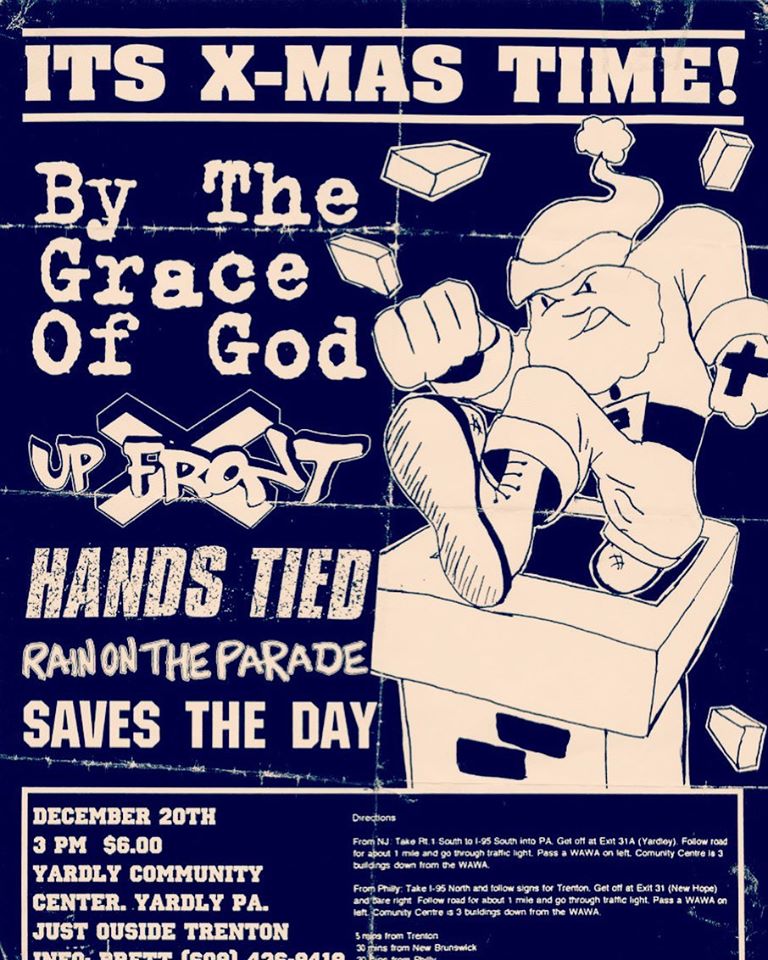
Since I have you both here, what is the story behind the material that eventually materialized on the Fired Up EP? That was originally meant to be part of a side project, correct?
Justin: Ronny can provide the full story here, but it has to do with cross pollinating rehearsal spaces.
Ronny: The Fired Up demo was supposed to be for a new band Smith and I were going to do after Rain on the Parade. It got as far as a demo, and that was it.
There was a point where Smith dropped out of the ROTP when he had planned on moving to California. DII was super busy around the same time, and was basically a band member in name only. So it was Justin and I with Jamie Heim, Matt Summers, and John Robinson as the new lineup. Justin dropped back to drums so Jamie and John could play guitars, and Summers played bass.
I really liked everyone in the new lineup, but there was some knocking heads over creative stuff and it all just came to a head one summer when we played an in-store show at a record shop on South Street in Philadelphia. I don’t recall the name of the store, but I do remember we played with Kid Dynamite.
For whatever reason, we weren’t getting along during the set for the in-store show. I don’t know if it was them or if it was me at the center of the argument, but I remember coming home from that show fed up. I called Smith, since I had recently heard he no longer had plans to move to California. He wasn’t home, so I got his answering machine.
The message I left was something like “Hey, you and me. Let’s do a new band since you’re not moving. I don’t want to do ROTP anymore. Here’s this song I’ve been working on…” And then I played “When I’m King” into the phone on my guitar. A week later, we ended up at our practice space with Brian Fahey on drums and banged out all of the music for the Fired Up demo in a single practice.
I’ll say, the transition between bands wasn’t handled well on my part. ROTP had some shows on the schedule to get through, and I was committed to finishing them out. So I kept my plans a secret, practicing and recording with the new band (Fired Up) while practicing with ROTP at the same time, at the same rehearsal space. Absolute amateur hour on my part.
So, of course Justin came into the practice space to buy some guitar strings one day. The owner of the space (Ed) chided Justin for being late to practice. Ed thought there was a ROTP practice going on that day, but it was actually a Fired Up practice. So when Justin walked back into the studio to see Smith and Fahey sitting there (when neither were in ROTP at that point), the jig was up and ROTP played a final show at the Melody Bar in New Jersey a few days later. Everyone in the band was angry at me, and it showed during our set. Not our finest show.
Fired Up had struggled to find a bassist, and then Brian quit because his primary band (Purpose) didn’t like him pulling double duty, so we recruited Tom Patterson to fill his place, but we never played a show as Fired Up.
After that summer, DII had more availability and wanted to play again. He didn’t even know we had broken up. I patched things up with Justin who, to his enormous credit, rarely lets anything bother him. We agreed to reform the band and only do it if the four of us were primary members from then on. Justin wanted to play guitar again, so Tom joined the band to complete the lineup.
Occasionally, Brad Fry from Pissed Jeans filled in on second guitar when DII couldn’t make a show, but from that point on, the band got on really well. With the Fired Up demo completed prior to ROTP re-forming, we just decided that demo should be a ROTP record. It was written by Smith and I. Just made sense to do it that way.
Rain on the Parade appeared on the Rebirth of Hardcore, a pretty sick compilation in 1999 that also included bands like In My Eyes and Ten Yard Fight. How did you land on that one?
Ronny: I don’t think there was any real story behind it, other than [Youth of Today vocalist, Supersoul Records founder] Ray Cappo wanted to load up the record with relevant bands at the time. So it was an honor to be included on the record. Ray asked us to do it, and we went into the studio a few weeks later and recorded two of the songs we were working on at the time ("Forgiven" and "Piper’s Pit").
Remember how I told you I could fill a book with all of the things I didn’t know back then? That was another thing to add to those pages. In hindsight, so many of the comp. tracks we recorded were absolute shredders. All of them combined would have made a really good standalone EP.
But, rather than finding cool covers to record for the compilation records we appeared on, we’d instead hand over some of our best stuff. I mean, it’s all good and I wouldn’t change a thing. But when I think back on it, we were really generous with some of our better songs.
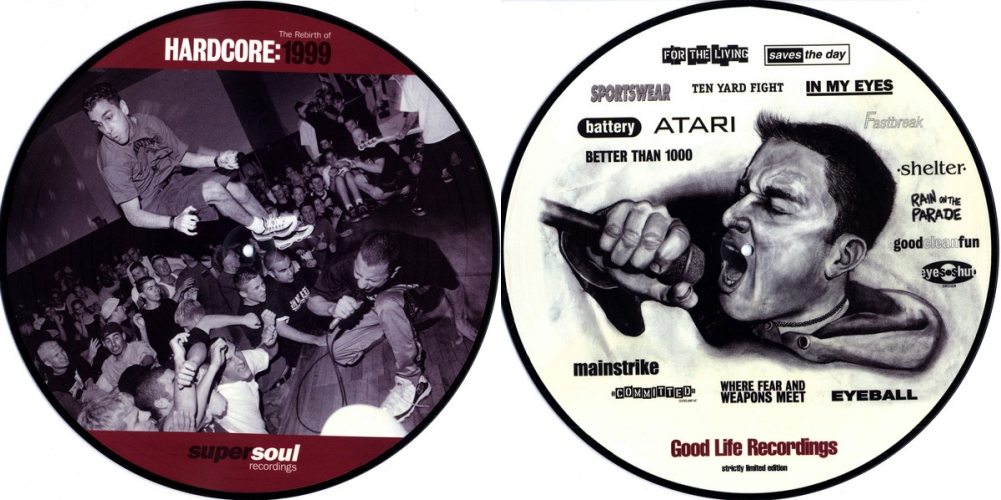
2000 saw the release of the band’s only full-length record, When It Rains It Pours. It came out on a label called Siren Electric, but I always wondered if other labels (Revelation, Equal Vision, etc.) had reached out to the band to work together.
Ronny: No, we never drew any interest from more established labels. I would have loved to get that call, but it never came.
Justin: This aspect has always irked me, a lingering issue that, in hindsight, shouldn't have bothered me as much. I often found myself comparing ROTP to other groups like Ten Yard Fight, Floorpunch, Hands Tied, and Kill Your Idols—with whom we frequently played with.
While they garnered label attention, we didn't. I used to attribute this to the fact that ROTP didn't accumulate enough "road time." Perhaps, had we been more aggressive in touring, the outcome might have been different.
Since the material on the album is a mix of earlier tracks and some newer ones, did you go that route because you knew you were breaking up and didn’t have enough songs to record?
Ronny: If I could do it all over again, that record would have been a 7” EP titled the Should Have Been An… EP. Because it should have been an EP. Basically, on our second attempt at a (failed) tour, we came to the consensus that to tour, we needed an LP. The result…wasn’t our best work.
There are songs on When It Rains It Pours that I have genuine affection for, particularly the opening track ("Hand Over Your X’s"). But there wasn’t enough good material to stretch across an album.
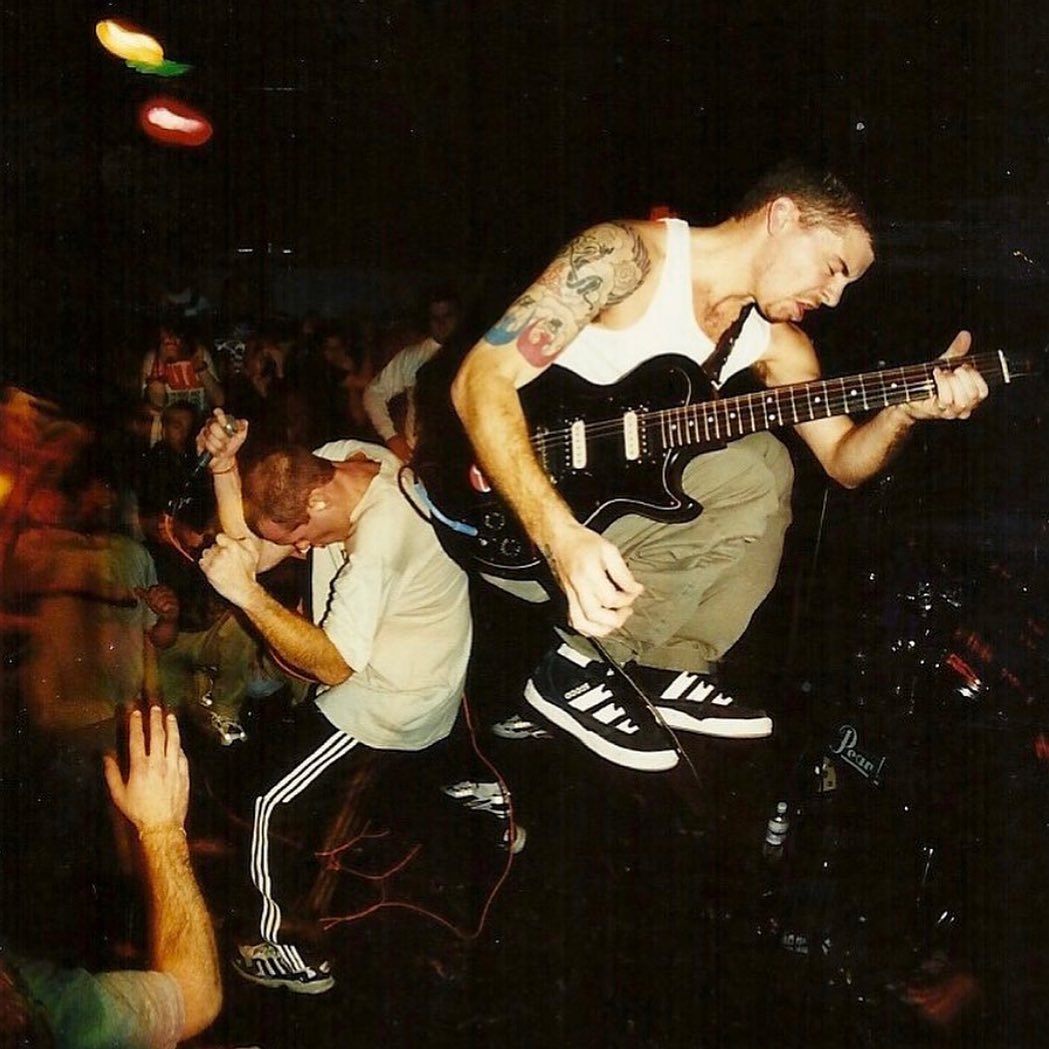
What led to the breakup of the band? Was it a matter of life getting busy for everyone or did you feel like you accomplished what you set out to do and wanted to close things out?
Ronny: I had recently been (read in Ray Cappo voice) DISENGAGED! I was devastated over the breakup with my ex, and wanted to start over somewhere new, which saw me move three hours away to Northern VA / DC. So geography became an issue.
The conversation over the band’s dissolution was basically like, “Yeah, sounds about right. This has gone as far as it’s gonna go.” I was happy it ended on a good note where we all liked each other.
When can we expect a Rain on the Parade reunion show (or two)? Are you close with the other former members these days?
Ronny: Justin and I have remained in touch over the years, but ever since I nuked my Facebook account from orbit back in 2017, I haven’t been in touch with DII, Smith, or Tom as much. We’re all pretty busy with our lives, and geography is a thing as well, with some of the guys living about an hour away.
It would be fun to do another reunion, but I’m not sure how I’d be able to pull it off on my end. I’m just too busy with my family to put in the practice time, and I’ve been out of the scene 20 + years now. Add to that, I haven’t spoken in anything above a “dad is angry” voice in many, many years. I don’t think my pipes could handle a 45-minute set anymore.
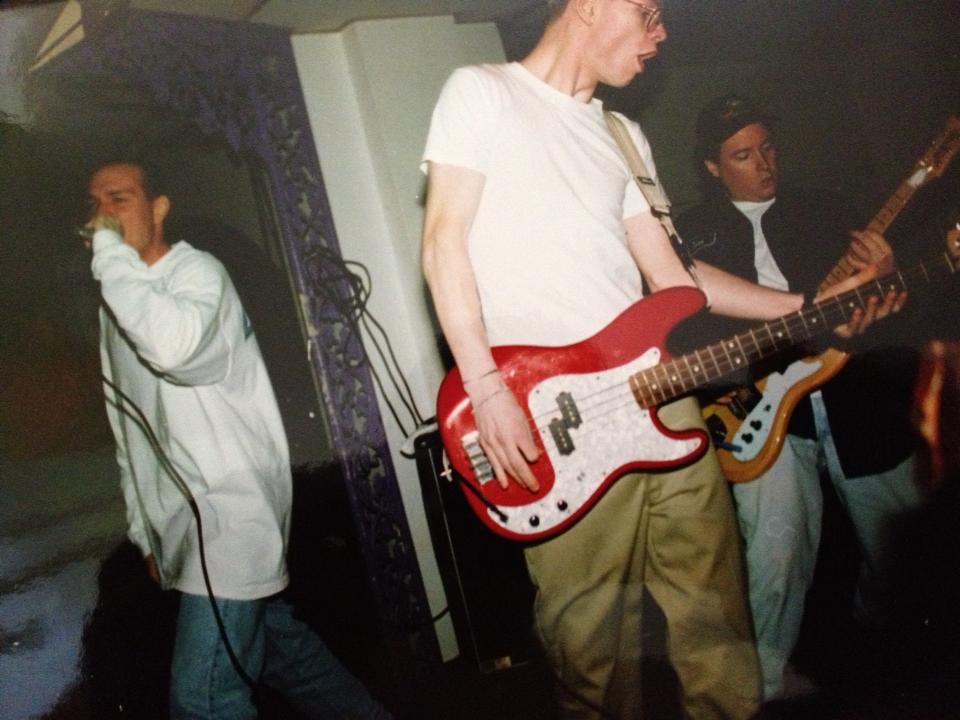
What is the ultimate Rain on the Parade song and why?
Ronny: In my opinion, it would definitely be "Body Bag." I feel like it’s our signature song. Musically, Justin nailed it. It’s unique. It doesn’t sound like any other song from that era, or the era that preceded it.
Lyrically, it just scored so many points on the metal-influenced music of the time, and served as a full-throated protest to the kind of music that contemporary “hardcore” labels were churning out in the early '90s.
That being said, years later, I look back and feel like I was gatekeeping. Who am I to say what hardcore music is, or what it can become? But it’s how I felt at the time, and I have no regrets about writing it.
***
Rain on the Parade on social media: Facebook | Instagram
***
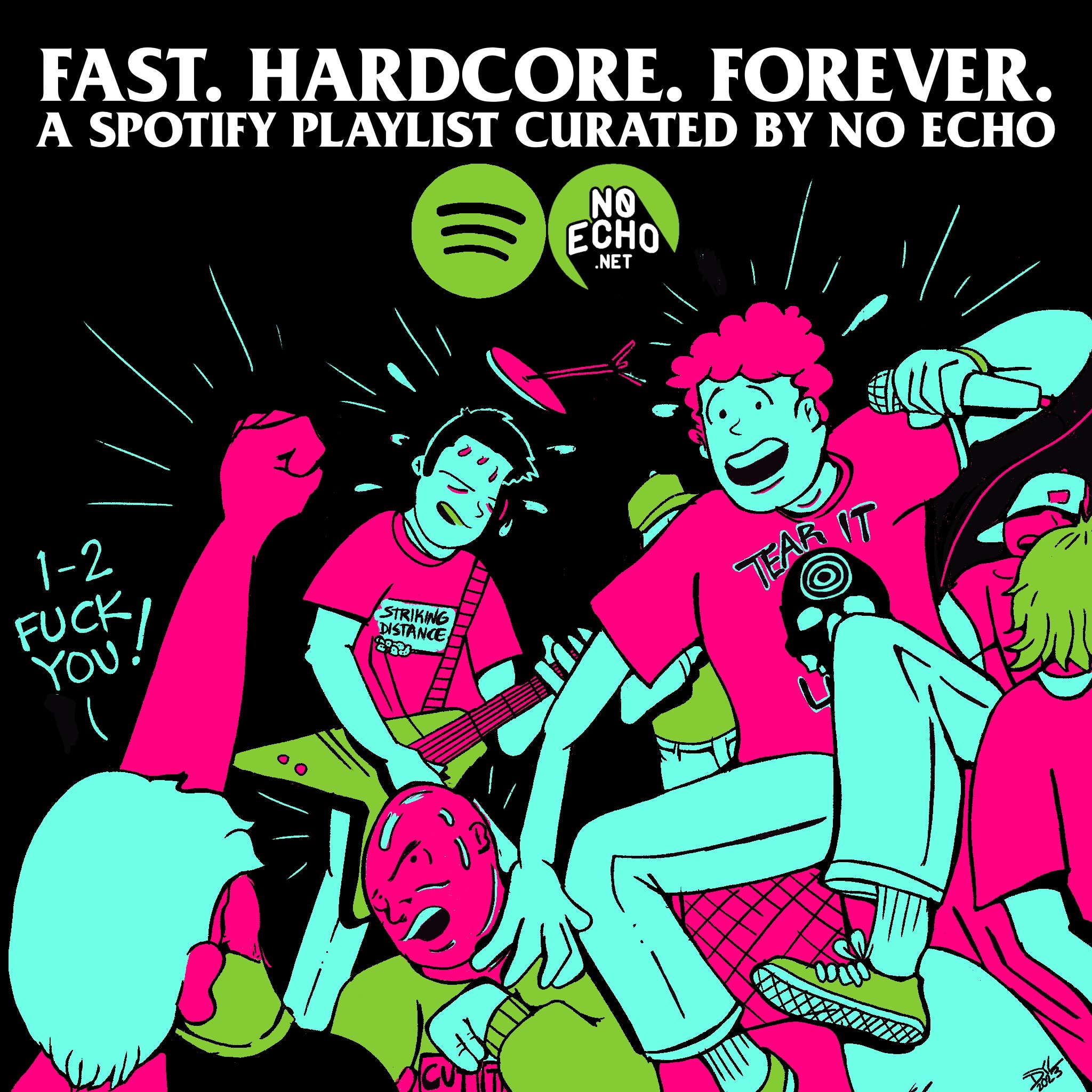
Tagged: rain on the parade

